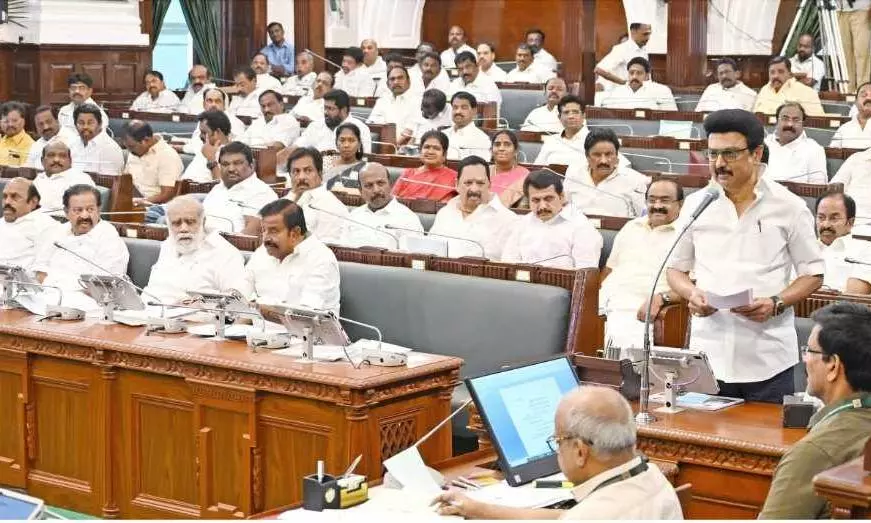
Tamil Nadu Assembly slams Waqf Bill, passes resolution against it
MK Stalin government's resolution adds to growing opposition to the Bill, intensifying Centre's clash with opposition-ruled states

After Karnataka, the Tamil Nadu Legislative Assembly on Thursday (March 27) unanimously adopted a resolution urging the Union government to immediately withdraw the Waqf (Amendment) Bill, 2024. Chief Minister MK Stalin branded the central bill “anti-Muslim” and said it stripped the Muslim community of its rights.
The resolution, tabled by Stalin, was supported by most of the parties present, including the opposition All India Anna Dravida Munnetra Kazhagam (AIADMK). The Bharatiya Janata Party (BJP) staged a walkout in protest, led by MLA Vanathi Srinivasan.
Also Read: Waqf Bill: History will never forgive this betrayal, Owaisi tells Naidu, Nitish
Waqf Bill
The Waqf (Amendment) Bill, 2024 seeks to amend the Waqf Act of 1954, which governs properties dedicated to Islamic religious and charitable purposes.
The proposed changes have sparked widespread controversy, with critics arguing that they centralise authority, undermine state-managed Waqf boards, and infringe upon Muslim community rights.
Tamil Nadu’s resolution adds to the growing opposition from states like Karnataka, intensifying the Centre's clash with opposition-ruled states.
Attack on federalism
In a strongly-worded address, Stalin accused the Centre of advancing an “anti-Muslim” agenda. “The Waqf (Amendment) Bill is anti-Muslim and will strip the community of all powers, leaving them unable to manage their own religious and charitable institutions,” he said. “This is an assault on federalism and a display of majoritarian overreach. I urge the Centre to withdraw this bill immediately.”
Watch | Waqf JPC report | Ruckus over dissident notes: What happens next?
Stalin framed the resolution as a defence of minority rights and Tamil Nadu’s autonomy, accusing the BJP-led Union government of eroding India’s secular fabric.
Opposition stand
The resolution received support from the AIADMK, Tamil Nadu’s primary opposition party, with senior leader SP Velumani speaking on its behalf. “The AIADMK stands with the people of Tamil Nadu and supports this resolution to protect the interests of Muslims and safeguard our state’s authority,” Velumani said.
The BJP, however, rejected the resolution, with its four MLAs walking out ahead of the vote. Vanathi Srinivasan, leading the walkout, accused the DMK of engaging in “petty politics” and opposing the Centre for political gain.
“The DMK is opposing everything the Centre does, but this won’t work anymore,” she said outside the Assembly. She defended the bill as a necessary reform to address mismanagement in Waqf properties, echoing the BJP’s national stance on promoting transparency and accountability.
BJP protests
The BJP’s absence underscored its isolation in the 234-member Assembly, where it continues to struggle for political traction. Outside the Assembly, BJP workers held a small protest denouncing the DMK’s “appeasement politics,” while DMK supporters celebrated the resolution as a victory for secularism.
The Waqf Bill has been contentious since its introduction, with critics — including Muslim organisations — claiming that provisions allowing the appointment of non-Muslims to Waqf boards and empowering district collectors weaken community autonomy.
The BJP, however, argues that these reforms address inefficiencies and long-standing disputes in the system. Vanathi’s mention of the JPC reflects the Centre’s efforts to temper criticism, though opposition-ruled states like Tamil Nadu remain firm in their opposition.
Also Read: 'Political hate comedy at its darkest': Stalin slams Yogi over language row jibe
Resolution passed
Despite the BJP’s walkout, the resolution passed unanimously among the remaining members, with DMK allies like the Congress and Communist parties also backing it. Tamil Nadu’s resolution heightens pressure on the Centre amid broader southern resistance to perceived central overreach.
The DMK’s position aligns with Stalin’s strategy of positioning himself as a key anti-BJP figure — a role strengthened since the 2024 Lok Sabha elections.
The AIADMK’s support, articulated by Velumani, suggests a calculated move to counter the DMK’s narrative while maintaining distance from the BJP, despite recent high-level interactions between AIADMK leaders and Union Home Minister Amit Shah.

